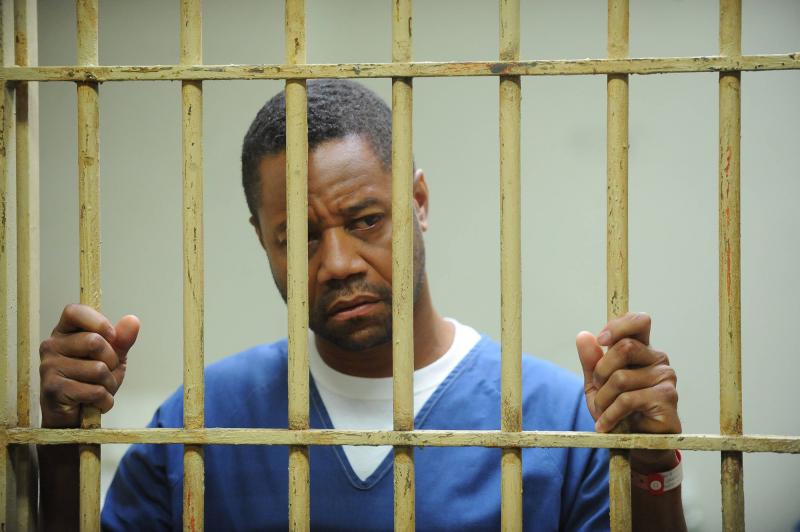The People v OJ Simpson: American Crime Story, BBC Two | reviews, news & interviews
The People v OJ Simpson: American Crime Story, BBC Two
The People v OJ Simpson: American Crime Story, BBC Two
Forensic biopic of fallen sports star

Halfway through its 10-week run, The People v OJ Simpson: American Crime Story appears to be running in real time as it slowly, painstakingly tells the story of how one of the US's biggest sports stars was accused of the murders of his ex-wife Nicole Brown and her friend Ronald Goldman in 1994.
Writers Scott Alexander and Larry Karaszewski have set out their stall from the off; they started the series with footage of the 1992 Los Angeles riots, sparked by the beating of African American taxi-driver Rodney King by LA police officers. When the murders occurred and Simpson was arrested, those tumultuous events were still fresh in everybody’s mind.
The prosecutors (almost entirely white) made a fatal error – in not recognising the burning anger that many black people still felt in what was a racially divided city – and sleepwalked into allowing the trial to be tried by a jury in the predominantly black Downtown area: such was their belief in the overwhelming evidence against Simpson. So when his defence team began promulgating the notion that OJ was a victim of LAPD racism, it was a turn of events for which the prosecutors simply weren’t prepared.
 The drama is based on Jeffrey Toobin’s book The Run of His Life: The People v OJ Simpson and, while court testimonies and witness statements, interviews, memoirs and biographies are in the public realm, there are wholly believable scenes in The People... in lawyers’ offices and Simpson’s home that one assumes came from insiders’ contributions. One could easily make the inference, for example, that at least one senior member of Simpson’s legal team believed him to be guilty from the off, and that a blind eye had been turned by many of the couple’s friends to the domestic violence that Brown suffered at Simpson's hands during their marriage.
The drama is based on Jeffrey Toobin’s book The Run of His Life: The People v OJ Simpson and, while court testimonies and witness statements, interviews, memoirs and biographies are in the public realm, there are wholly believable scenes in The People... in lawyers’ offices and Simpson’s home that one assumes came from insiders’ contributions. One could easily make the inference, for example, that at least one senior member of Simpson’s legal team believed him to be guilty from the off, and that a blind eye had been turned by many of the couple’s friends to the domestic violence that Brown suffered at Simpson's hands during their marriage.
Some of the cast are doing pretty passable impersonations of those whom the court case made famous: David Schwimmer as the nice but dim Robert Kardashian, OJ’s loyal friend; Sarah Paulson (pictured above) as chief prosecutor Marcia Clark, unfairly vilified for allowing the defence to turn the trial into a branch of showbusiness; and – a revelation, this – a positively lizard-like John Travolta as chief defence counsel Robert Shapiro, who was in turn supplanted by the ruthlessly ambitious Johnnie Cochran, played with quiet effectiveness by Courtney B Vance.
And, while Cuba Gooding Jr can’t replicate the stunning good looks and charisma of Simpson in his prime, he neatly conveys the pampered sports star’s ego, childish tantrums and monumental self-belief.
In last night’s instalment, The Race Card, Cochran’s role in proceedings came to the fore in the opening days of the trial. His tactics and mind games with the prosecution sliced through what seemed to many as clearcut evidence, and the earnest prosecutors were no match for his machiavellian ways as he brilliantly stage-managed court proceedings, which were shown live on television.
Like many courtroom lawyers, Cochran – with his gaudy dress sense and florid language – had a touch of the showman about him, as did Dominick Dunne (Robert Morse) who sat through every day of the trial and wrote memorable despatches for Vanity Fair.
The script, acting and direction (last night's episode by John Singleton) are superb, and 22 years after those famous scenes – of Simpson making an escape attempt along LA freeways in his speeding white Bronco, and of the trial and subsequent acquittal – we’re reminded that few stories have a definitive ending. Just look at the inexorable and inexplicable rise of the next Kardashian generation, Simpson’s later incarceration for robbery, and the recent debate about the white Oscars. Sometimes history seems to have a mind of its own.
rating
Explore topics
Share this article
The future of Arts Journalism
You can stop theartsdesk.com closing!
We urgently need financing to survive. Our fundraising drive has thus far raised £49,000 but we need to reach £100,000 or we will be forced to close. Please contribute here: https://gofund.me/c3f6033d
And if you can forward this information to anyone who might assist, we’d be grateful.

Subscribe to theartsdesk.com
Thank you for continuing to read our work on theartsdesk.com. For unlimited access to every article in its entirety, including our archive of more than 15,000 pieces, we're asking for £5 per month or £40 per year. We feel it's a very good deal, and hope you do too.
To take a subscription now simply click here.
And if you're looking for that extra gift for a friend or family member, why not treat them to a theartsdesk.com gift subscription?
more TV
 Blu-ray: The Sweeney - Series One
Influential and entertaining 1970s police drama, handsomely restored
Blu-ray: The Sweeney - Series One
Influential and entertaining 1970s police drama, handsomely restored
 I Fought the Law, ITVX review - how an 800-year-old law was challenged and changed
Sheridan Smith's raw performance dominates ITV's new docudrama about injustice
I Fought the Law, ITVX review - how an 800-year-old law was challenged and changed
Sheridan Smith's raw performance dominates ITV's new docudrama about injustice
 The Paper, Sky Max review - a spinoff of the US Office worth waiting 20 years for
Perfectly judged recycling of the original's key elements, with a star turn at its heart
The Paper, Sky Max review - a spinoff of the US Office worth waiting 20 years for
Perfectly judged recycling of the original's key elements, with a star turn at its heart
 The Guest, BBC One review - be careful what you wish for
A terrific Eve Myles stars in addictive Welsh mystery
The Guest, BBC One review - be careful what you wish for
A terrific Eve Myles stars in addictive Welsh mystery
 theartsdesk Q&A: Suranne Jones on 'Hostage', power pants and politics
The star and producer talks about taking on the role of Prime Minister, wearing high heels and living in the public eye
theartsdesk Q&A: Suranne Jones on 'Hostage', power pants and politics
The star and producer talks about taking on the role of Prime Minister, wearing high heels and living in the public eye
 King & Conqueror, BBC One review - not many kicks in 1066
Turgid medieval drama leaves viewers in the dark
King & Conqueror, BBC One review - not many kicks in 1066
Turgid medieval drama leaves viewers in the dark
 Hostage, Netflix review - entente not-too-cordiale
Suranne Jones and Julie Delpy cross swords in confused political drama
Hostage, Netflix review - entente not-too-cordiale
Suranne Jones and Julie Delpy cross swords in confused political drama
 In Flight, Channel 4 review - drugs, thugs and Bulgarian gangsters
Katherine Kelly's flight attendant is battling a sea of troubles
In Flight, Channel 4 review - drugs, thugs and Bulgarian gangsters
Katherine Kelly's flight attendant is battling a sea of troubles
 Alien: Earth, Disney+ review - was this interstellar journey really necessary?
Noah Hawley's lavish sci-fi series brings Ridley Scott's monster back home
Alien: Earth, Disney+ review - was this interstellar journey really necessary?
Noah Hawley's lavish sci-fi series brings Ridley Scott's monster back home
 The Count of Monte Cristo, U&Drama review - silly telly for the silly season
Umpteenth incarnation of the Alexandre Dumas novel is no better than it should be
The Count of Monte Cristo, U&Drama review - silly telly for the silly season
Umpteenth incarnation of the Alexandre Dumas novel is no better than it should be
 The Narrow Road to the Deep North, BBC One review - love, death and hell on the Burma railway
Richard Flanagan's prize-winning novel becomes a gruelling TV series
The Narrow Road to the Deep North, BBC One review - love, death and hell on the Burma railway
Richard Flanagan's prize-winning novel becomes a gruelling TV series
 The Waterfront, Netflix review - fish, drugs and rock'n'roll
Kevin Williamson's Carolinas crime saga makes addictive viewing
The Waterfront, Netflix review - fish, drugs and rock'n'roll
Kevin Williamson's Carolinas crime saga makes addictive viewing

Add comment